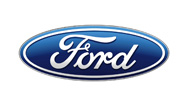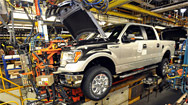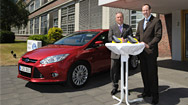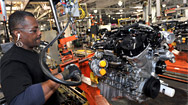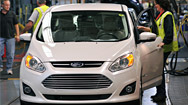End of Life
Automobiles are one of the most highly recycled consumer products in the world. All vehicles contain parts and materials – particularly iron, steel and aluminum – that can be recovered at the end of their useful lives. In North America, about 95 percent of vehicles that go out of registration are processed by a dismantler or scrap metal recycling facility, with approximately 86 percent of the vehicle by weight recovered for reuse, remanufacturing or recycling.
In theory, end-of-life vehicles are more than 95 percent recoverable. In practice, however, the cost in energy and labor to recover the final fractions often exceeds the value of the materials, and recent independently reviewed environmental studies suggest that such efforts offer no value to the environment. Ford focuses on achieving the highest economically viable and environmentally sound recovery percentage through a number of means, including selection of materials, labeling and providing information to dismantlers on materials and methods for treatment.
In the EU, automakers are required by EU Directive 2000/53/EC to ensure a cost-free take-back of vehicles (that they put on the market) at the end of their lives. This directive also requires that end-of-life vehicles (ELVs) are treated in an environmentally responsible manner. Since 2002, Ford has been at the forefront of providing return networks in the EU member states that have established regulations. Ford now has ELV take-back and recycling networks for Ford brand vehicles in 19 EU markets and participates in collective ELV recycling systems in another 10. Ford was the first major manufacturer in the U.K. to put in place a comprehensive plan that met the European Commission’s ELV directive. By working with Cartakeback.com, Ltd., we have a network of nearly 230 facilities providing unrivaled convenience to the last owner for the professional take-back, receipt and treatment of end-of-life vehicles.
In May 2007, Ford became one of the first European automakers to be certified in compliance with ELV requirements by demonstrating to external authorities that the Ford processes properly manage the reusability, recyclability and recoverability aspects of vehicles. In 2012, this certification was extended by another two years and now comprises all of Ford Motor Company operations globally. All Ford vehicles marketed in Europe are now certified as reaching recyclability of 85 percent and recoverability of 95 percent. An increasing number of vehicle models produced and designed in the U.S. are also following this approach. For example, all U.S. models exported to South Korea are providing self-certification documents meeting the 85–95 percent recoverability requirement.
Ford has participated in research into alternative treatments for end-of-life vehicles. Most of the plastic, foam and other nonmetal vehicle materials end up being shredded. Most of this “auto shredder residue” (ASR) ends up going to landfill. We have been working to assess the environmental impacts of burning ASR for energy. Together with other European automotive manufacturers, we sponsored a fully ISO 14040-compliant lifecycle assessment that showed that – from a purely environmental point of view – using recycled ASR for energy recovery is as beneficial as recycling it.



